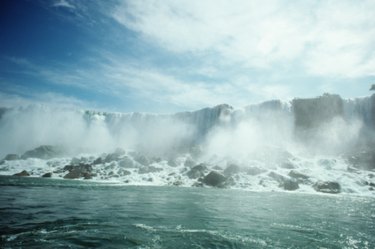
There is a lot of mystery surrounding water – especially when it comes to how much you should drink. Water is absolutely vital for your body's good health, since around 60 percent of your body weight is water. Dehydration is dangerous, but people can also – on rare occasions – drink too much water. So, how much water do you actually need? Do you need to drink water even when you are not thirsty?
Daily Recommendations
Video of the Day
According to MayoClinic.com, you should drink around 8 or 9 cups of water a day, but there are several ways to look at this. The replacement approach says since you lose around 2 cups of water a day through various processes, you need to drink 2 L – just a bit more than your 8 cups -- of water or other beverages daily. You could also follow the eight by eight rule – eight 8 oz. glasses of liquids a day. Or, you could simply follow the Institute of Medicine's recommendations: around 13 cups daily for men and 9 cups daily for women.
Video of the Day
When to Drink
The best way to tell if you are getting enough water is the color of your urine. If your urine is colorless or only slightly yellow each day, you are probably getting enough liquid. Some experts say you should drink only when you feel thirsty or you will consume too much water. However, MayoClinic.com cautions this may not be enough, since by the time you become thirsty, you might already be slightly dehydrated.
Dehydration and Over-Drinking
One of the reasons you should not wait to feel thirsty is that as your body ages, it is not as able to send thirst signals to your brain when you are dehydrated. However, it is also possible to drink too much water. ScientificAmerican.com reports several cases of hyponatremia, in which athletes or others drank so much water their bodies were unable to handle it. This led to brain swelling and death. However, the people in these cases consumed water in extreme amounts, which is unlikely to occur normally.
Conclusion
A good guideline to follow is the MayoClinic.com suggestion: drink a glass of water with every meal and drink water to recover from exercise. You should not wait until you feel thirsty to begin drinking water; however, some people are afraid of drinking too much. In most cases, only endurance athletes are at risk for hyponatremia, so most people do not need to worry about drinking too much. Drink water in moderation even if you do not feel thirsty.